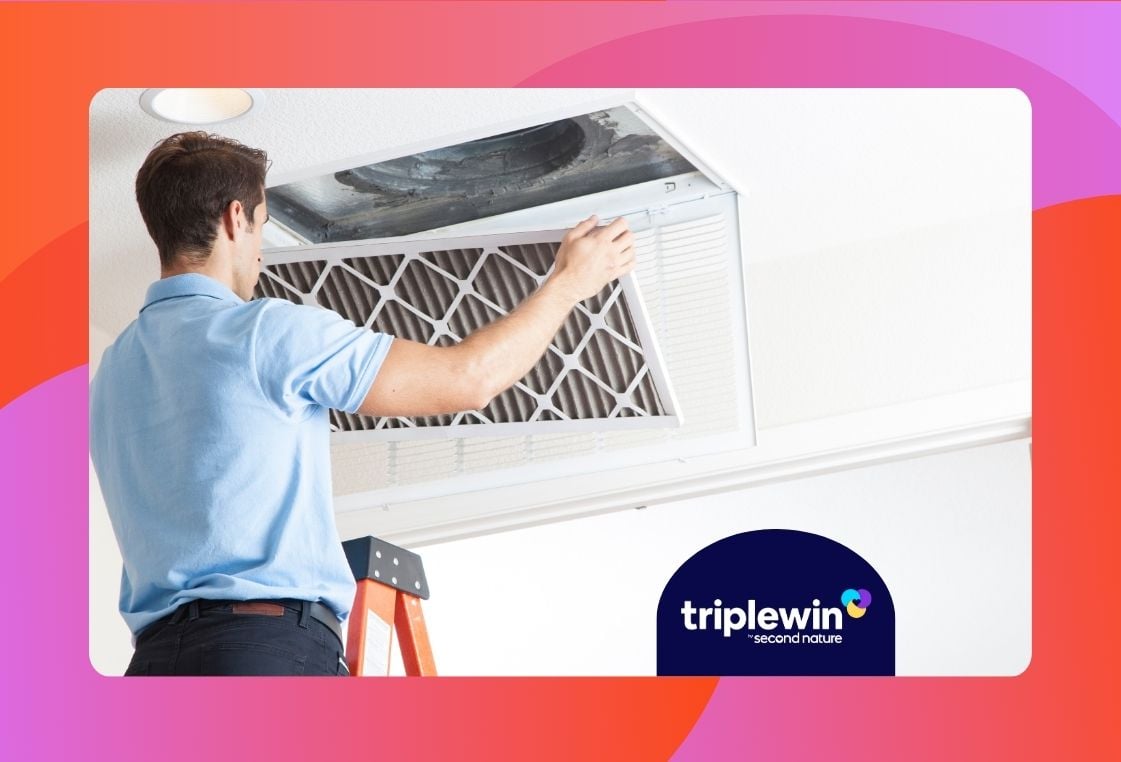Change your filters already!
Learn how to change air filters and do it already!
You had to know this one was coming.
For our fifth and final installment of Second Nature’s Tips for an Efficient Home, we want to remind you to change your air filters. There aren’t many routine home maintenance practices that are forgotten with more regularity than the air filter change. You should replace air filters in your home at regular intervals multiple times a year, but we all know someone who hasn’t even looked at their air filters in years (that's been us too, once upon a time).
How to Change an Air Filter in Your House
Changing air filters is one of the easiest ways to keep your home efficient. It’s probably the easiest of any practices highlighted in this series. That’s because home air filter installation is as simple as opening your vent, taking out the old one, and putting in the new one, or at least it’s that simple (shameless plug inbound) when you use Second Nature.
Related: What is the resident benefits package?
Why Changing Air Filters is Important
Air filters do two things. They clean the air that circulates through your HVAC system, allowing you to breathe fresh air inside your home, and they preserve the health of said system by keeping particles and gunk from building up on it. Your system runs more efficiently with a quality air filter installed and will last longer as the result of reduced stress.
How to Choose the Best Air Filter for Your Home
First, you need the right air filter. Skip the fiberglass and go straight to pleated. Fiberglass air filters is a bit of a misnomer since they are horrible at filtration. They do virtually nothing to keep pollutants out of your air. It’s better for air flow immediately, because it offers so little resistance, but detrimental to the long-term health of your system (and you!), as all the particles that pass through can build up on your HVAC coils and shorten the lifespan. This can result in costly repairs and even replacement.
Pleated air filters are the best option for your health and your HVAC’s health. Their construction allows for much more effective and efficient filtration, which keeps that nasty stuff out of your lungs and off your system. Unless your HVAC is quite old (like really old), the more tightly wound construction of a pleated air filter won’t starve your unit of air flow. You've heard that last bit before. We're here to dispel that myth. You ready?
Pleated air filters do not restrict airflow to your HVAC system!
How does changing an air filter save you money?
Great question. It does so in two ways. Efficient air flow through your vents minimizes the work your HVAC has to do to keep your home the desired temperature. An air starved system must run harder and longer to do so, which drives up your energy usage and ultimately your electrical bill.
As your air filter catches pollutants, it begins to lose air flow efficiency as it becomes filled with dust, pollen, and any other clean air assailants it has vanquished from your home. It’s good that it’s catching these, but if you leave the filter in too long, the buildup of particle matter starts forcing the HVAC unit to work harder to get air. Now you have a system that’s struggling, thus producing higher energy costs. Learning how to change an air filter that’s dirty for a new one provides an immediate remedy to that and, as a continued practice, can boost the efficiency of your HVAC system by 15%.
This boosted efficiency can extend the lifespan of your system as well, which will save you money years down the line in addition to the immediate benefits.
How often is regularly?
Glad you asked. The answer depends on many factors. Typically, we would recommend you do a new home air filter installation every three months, but certain elements can push this number down. If you live in a heavily polluted area, that filter will get dirty faster. Simply put, a dirty filter does a terrible job of filtering and needs to be changed. Add pets to the equation, and you might need to replace the air filter in your home every one or two months. It will depend entirely on your specific situation. Choosing air filters with higher MERV ratings is also beneficial for keeping your indoor air quality at a healthy level. Not sure which size air filter you need? Learn about the different air filter sizes to make sure you choose the best option for your home.
If you want our opinion on your particular case, you can always ask!
Tweet us
Facebook Message us
Email us
And that’s how you can save 15% on your heating and cooling costs. Just swap out your air filters four times a year! If you’re interested in not having to remember this (another shameless plug coming in hot), we’ll ship high-quality, USA-made air filters right to your door when it’s time to change them.
Topics:


